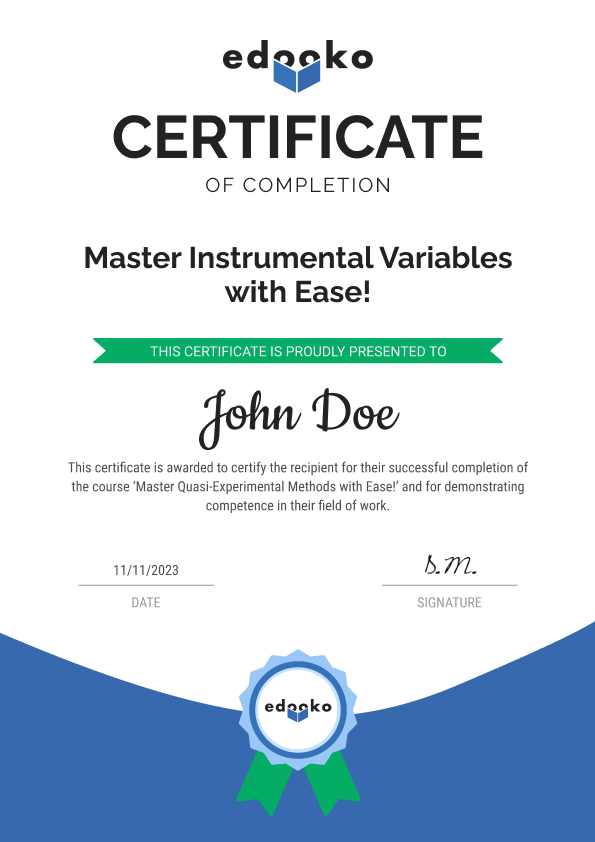Stop wasting countless hours and money trying to research and understand complex methods.
Understand complex problems quickly in a matter of hours instead of weeks.
WARNING: The information in this program is powerful and could save you up to $10,000 in course fees, book costs, tutor expenses and your time.




In just under 2 hours of jam-packed content for Masters and PhD students with limited math knowledge who want to learn econometric methods to address bias in regression analysis using proxy variables (instruments). Each course is broken down into short easy to understand videos.
Module 1
Module 2
Module 3
Module 4
Module 5
Module 6
Module 7
Module 8
Module 9
Understand when Instrumental Variables work and when they do not.
Module 10
Module 11
Module 12
Take the principles we teach inside this program to enrich and provide depth to your research papers.
Do not let math anxiety hold you back! Our advanced courses are accessible to even those with a limited math background.
We leverage the expertise of education and pedagogy professionals to design courses that are easy to understand and remember.
Designed by a creative director and read by a professional narrator, our courses tell a visual story to engage learners and facilitate understanding.
1h 50m
12 Modules
Prof. dr. Deni Mazrekaj
Stata and R
Upon finishing a course on Instrumental Variables, you will be able to:

Not sure whether this program is right for you? That’s no problem. Enter your email below and experience one of the modules absolutely for FREE.
No credit card required.
“I was skeptical about how much I would be able to learn in a course without a strong math background, but this course exceeded my expectations. The instructors’ clear explanations and intuitive approach made it easy to grasp the math concepts and apply them in my work. Thank you!”
– Mark Brown
Edooko guarantees that if you put in the work and implement what you learn, you will have an elite-level understanding of the fundamentals of Instrumental Variables with limited mathematical experience.
If for some reason you don’t feel like that is true, then just shoot us an email at [email protected] within 5 days and we’ll refund you. It is that easy.
But if you’re like most students who have learned what we’re going to teach you here, this course will transform the way you think about Instrumental Variables (and for some of you, it’ll change your life!)
T&C’s apply

This course was developed by an award winning professor, dr. Deni Mazrekaj, with the support of a dedicated team of researchers, educational specialists, and content creators.
Deni Mazrekaj is a professor of sociology at Utrecht University and an affiliated researcher at the University of Oxford. He holds a Ph.D. in Economics from KU Leuven. Deni has taught Advanced Quantitative Methods at the University of Oxford and is currently the coordinator of the Methods and Statistics course at Utrecht University. In his spare time, he is an associate editor of the interdisciplinary Nature journal Humanities & Social Sciences Communications. Deni has received several awards from the American Sociological Association, and the European Academy of Sociology for his research in sociology.
As a data scientist, I struggled to understand quasi-experimental methods and how to apply them. This course not only provided a clear and concise overview of the concepts but also allowed me to practice using them in various scenarios. I feel much more prepared and confident in my abilities now.
I was intimidated by the math-heavy courses on quasi-experimental methods, but the “Instrumental Variables” course was exactly what I needed. The intuitive approach made it easy to understand and now I feel confident in my ability to apply these techniques in my research.
I was skeptical about how much I would be able to learn in a course without a strong math background, but this course exceeded my expectations. The instructors’ clear explanations and intuitive approach made it easy to grasp the math concepts and apply them in my work. Thank you!
I didn’t expect a course on Instrumental Variables to be so engaging! The clear examples, real-life applications, and well-structured lessons kept me motivated throughout. I’m now using the techniques I learned in my own research with great success.
The mix of theoretical insights and hands-on practice in this course was exactly what I needed. It’s one thing to understand the theory, but being able to apply it in real-world scenarios using Stata was invaluable. I highly recommend this course for anyone looking to deepen their knowledge of causal inference.
I have taken several statistics courses before, but none have explained the concept of Instrumental Variables as clearly as this one. The instructor’s approach to simplifying complex ideas without compromising depth is exceptional. I now feel more confident in my data analysis skills.